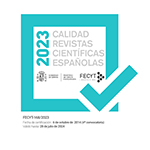Crisis, educación y precariedad-afluencia. El rol de la educación en las condiciones de vida de la población española
Resumen
El objeto de este artículo es estudiar la influencia del nivel educativo (capital cultural) en los procesos de precariedad-afluencia de la población española entre los años posteriores a la crisis de inicio de la década de 1990 y los años más duros de la crisis de 2007. A partir de los datos de las encuestas PHOGUE y ECV del Instituto Nacional de Estadística (INE) se han construido cuatro indicadores para medir la precariedad laboral, de ingresos, de salud y de vivienda y su distribución según distintas variables demográficas. Se pretende contrastar la hipótesis de que más educación significa más protección frente a la precariedad, estudiando diferentes condiciones de las condiciones de vida y existencia en momentos tanto de crecimiento como de crisis económica. Mediante un análisis multivariable se intenta determinar el nivel de impacto del capital cultural, alcance, evolución y, sobre todo, si sus efectos positivos o negativos están en proceso de expansión o desaceleración. El resultado tiene una doble aportación: de un lado, metodológica, consistente en la construcción de los indicadores; de otro lado, los resultados, con los que se puede reevaluar algunas generalizaciones sobre la pérdida de importancia del rol de la educación en las sociedades contemporáneas.
Descargas
Descarga artículo
Licencia
La revista Política y Sociedad, para fomentar el intercambio global del conocimiento, facilita el acceso sin restricciones a sus contenidos desde el momento de su publicación en la presente edición electrónica, y por eso es una revista de acceso abierto. Los originales publicados en esta revista son propiedad de la Universidad Complutense de Madrid y es obligatorio citar su procedencia en cualquier reproducción total o parcial. Todos los contenidos se distribuyen bajo una licencia de uso y distribución Creative Commons Reconocimiento 4.0 (CC BY 4.0). Esta circunstancia ha de hacerse constar expresamente de esta forma cuando sea necesario. Puede consultar la versión informativa y el texto legal de la licencia.











